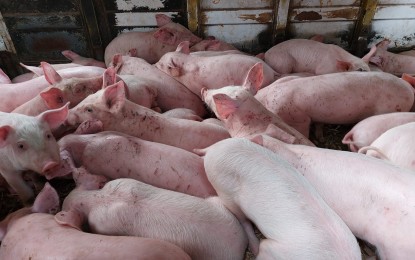
(PNA file photo)
LEGAZPI CITY – The Department of Agriculture in Bicol (DA-5) reported on Thursday that some of the municipalities and cities previously affected by the African swine fever (ASF) have been upgraded into “pink zones”, which means they have recovered from the infestation.
In an interview, Lovella Guarin, DA-Bicol spokesperson, said of the 72 towns and cities in the Bicol Region previously affected by the ASF, 52 were upgraded from "red" to "pink".
"Red" zones are infected areas while “pink” zones serve as a buffer, where ASF is not present although it is adjacent to an infected zone.
"As of Jan. 15, 2024, we have accomplished 72 percent of the total affected municipalities and cities in the six provinces of the region," she said.
The remaining affected local government units (LGUs) are in Camarines Sur -- seven; Camarines Norte -- nine; Sorsogon and Masbate -- two towns each. Catanduanes and Albay have no ASF-affected towns.
Guarin added that they are still waiting for other LGUs to submit needed documents to be declared ASF-free.
"Meron kasing mga LGUs dyan na wala ng cases pero hindi pa nakaka-submit ng required documents kaya hindi pa sila ma declare na ASF-free. Once maka submit na sila mas mababa na yan number na yan (There are LGUs that have no more cases of ASF but have yet to submit the required documsnts to be declared ASF-free. Once they submit the required documents, the figures will go down)," she said.
Guarin said DA-Bicol is monitoring LGUs in the region previously affected by ASF.
"DA-Bicol continues to implement Bantay ASF sa Barangay (BABay ASF Program) and the Integrated National Swine Production Initiatives for Recovery and Expansion (INSPIRE) under the Bureau of Animal and Industry (BAI) and the National Livestock Program, respectively, aimed at bringing the hog industry back to its feet," she said.
The BABay ASF Program extends technical assistance including disease monitoring, surveillance, and monitoring efforts, which include setting up biosecurity measures for commercial and backyard piggeries and the training and designation of Barangay Biosecurity Officers.
The INSPIRE Program, on the other hand, aims to accelerate the repopulation and recovery of the pig industry through calibrated repopulation and intensified production; establishment of breeder multiplier farms; intensified biosecurity and enhanced surveillance; and expansion and modernization of semi-commercial and commercial farms through credit support. (PNA)
